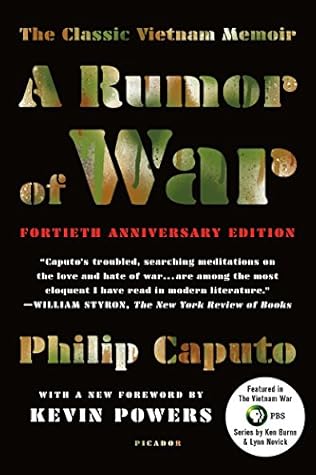More on this book
Community
Kindle Notes & Highlights
There are, of course, aspects of combat that one does not comprehend without the luxury of having escaped it.
Sweetwilliam and 1 other person liked this
Most of all, we learned about death at an age when it is common to think of oneself as immortal. Everyone loses that illusion eventually, but in civilian life it is lost in installments over the years. We lost it all at once and, in the span of months, passed from boyhood through manhood to a premature middle age.
Matan and 1 other person liked this
No great dependence is to be placed on the eagerness of young soldiers for action, for the prospect of fighting is agreeable to those who are strangers to it. —Vegetius ROMAN MILITARY WRITER 4TH CENTURY A.D.
Matan and 4 other people liked this
I came home from the war with the curious feeling that I had grown older than my father, who was then fifty-one. It was as if a lifetime of experience had been compressed into a year and a half.
Spiritedbookishbabe and 4 other people liked this
I was so terrified of being found wanting that I even avoided getting near the candidates who were borderline cases—the “marginals,” as they were known in the lexicon of that strange world. They carried the virus of weakness.
Sweetwilliam liked this
During one particularly dull lecture, a classmate named Butterfield leaned over to me. “You know,” he whispered, “the trouble with war is that there isn’t any background music.”
Matan and 6 other people liked this
Even among the most disciplined troops, a route-column has an “accordion effect.” It stretches and contracts because of differences in stride.
We pick ourselves up, slowly, unwillingly, like convicts in a workgang, and are at it once more. One foot in front of the other. Pick ’em up and put ’em down. Sometimes I could not remember ever having done anything else. My college years receded, and it seemed as if I had spent almost all my life humping a too heavy pack beneath too hot a sun down a road that was too long. The essence of the Marine Corps experience, I decided, was pain.
Sweetwilliam liked this
But the most significant changes were not the physical ones. We had become self-confident and proud, some to the point of arrogance. We had acquired the military virtues of courage, loyalty, and esprit de corps, though at the price of a diminished capacity for compassion.
Sweetwilliam liked this
Banks was a soft-spoken black who had fought in Korea and was therefore regarded as a living relic by his teen-age squad. He was, in fact, not more than thirty or thirty-one.
Drill was an art form to him, and no choreographer could have derived as much satisfaction from staging a ballet as Campbell did from marching his marines around a parade deck.
Sweetwilliam liked this
Leading patrols in the Okinawan jungles turned out to be far more difficult than it had been in Quantico’s forests, which seemed parklike by comparison. I nearly got lost several times, only proving the truth of the old service adage that the most dangerous thing in the world is a second lieutenant with a map and compass.
Sweetwilliam liked this
“Christ, what lit the fire under your tail?” He was a few numbers my junior and had just arrived on the Rock, so I composed myself and tried to sound coolly professional.
I think they also felt a little let down. The haste with which they had been sent to Vietnam caused them to assume that the situation was desperate. The wagon train was surrounded and the cavalry had to come to the rescue. They had whipped themselves into such a fever of anticipation that reality proved to be an anticlimax. Rather than desperate, the situation appeared to be totally calm. Yes, the wagons were here, in the form of supersonic warplanes, but the Indians were not.
Sweetwilliam liked this
I had lain awake all night trying to conceive of every contingency and then rehearsing what I would do in each case. Over and over again until, exhausted by the mental effort, I had entertained myself with fantasies of personal heroics.
I had read all the serious books to come out of the World Wars, and Wilfred Owen’s poetry about the Western Front. And yet, I had learned nothing. “All the poet can do today is warn,” Owen wrote.
They had already been where we were going, to that frontier between life and death, but none of us wanted to listen to them. So I guess every generation is doomed to fight its war, to endure the same old experiences, suffer the loss of the same old illusions, and learn the same old lessons on its own. The country changed.
My unsung task in that statistical war was to do the arithmetic. If I had been an agent of death as a platoon leader, as a staff officer I was death’s bookkeeper.


